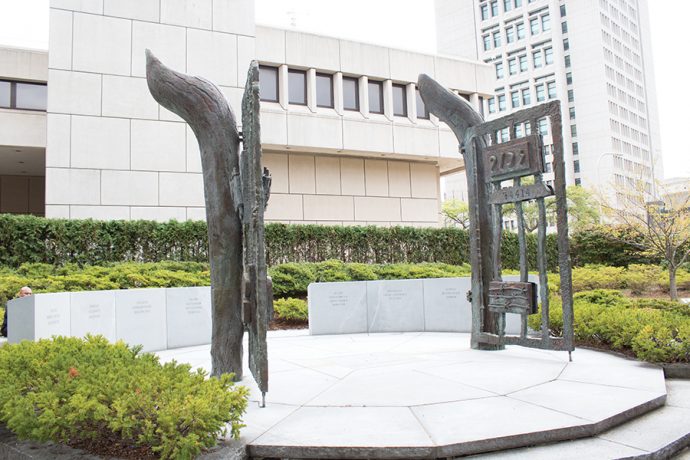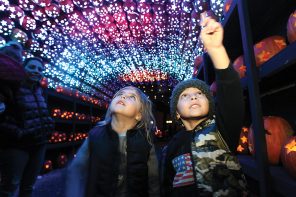The Holocaust, or Shoah, refers to the extermination of six million European Jews by the Nazis and their allies during World War II. It was an abyss of bigotry, hate and violence.
But it has also been the springboard from which the Holocaust & Human Rights Education Center has launched discussions of civil rights abuses and other social injustices.
“If we can understand the Holocaust, it will help us understand today’s events,” says Millie Jasper, the Harrison-based center’s executive director.
Last year, the center launched its Holocaust Memorial Preservation Workshop, an 18-week course in which the children and grandchildren of Holocaust survivors learn how to share their stories, using audio/video files and PowerPoint presentations.
“We get a lot of requests for Holocaust speakers from high schools, for example,” Jasper says, referring to the center’s Speakers Bureau, made up of 28 Holocaust survivors and two World War II concentration camp liberators. Sadly, however, it is a group that is increasingly dying off.
“One day when survivors are no longer able to tell their stories, we’ll have other generations going forward. That’s why we call this group GenerationsForward, with the ‘forward’ in italics.’”
Technology plays a key role in preserving and communicating not only the stories of the survivors but the poignant tales of those who lived with them as well.
“The Holocaust survivors tell stories that are extraordinarily engaging,” Jasper says, “but the second generation has a story to tell — of being raised by frightened parents who were overly cautious or hearing parents wake from a nightmare.”
The workshop, which contains roughly 12 people, is led by Jill Purdy Sarkozi, founding CEO of Safekeeping Stories. In turn, Jasper says, the Holocaust & Human Rights Education Center can scan its materials and place them on an interactive website map, part of the center’s Holocaust Survivor Legacy Education Project, as a resource for everyone.
It’s just one of the many ways in which the center connects with the community, teachers, students and those in the legal and medical professions. (See sidebar.)
In 1992, the center — formerly the Westchester Holocaust Education Center and Westchester Holocaust Commission — inaugurated the Garden of Remembrance at Westchester County’s Michaelian Office Building. The garden contains Rita Rapaport’s “Gates of Remembrance,” whose seemingly wind-blown posts, bars and plaques suggest everything from concentration camp entrances to the Bibles destroyed on Kristallnacht, or the “Night of Broken Glass,” a 1938 pogrom against Jews in Nazi Germany that many see as the beginning of the Holocaust. There are the names of 26 places in which Jews and other Nazi victims were tortured and executed. There are quotations from people such as writer Elie Wiesel, who survived, and a statue of writer Anne Frank, who didn’t.
The Holocaust center also hosts public lectures at various venues, including Purchase and Iona colleges, the Emelin Theatre and the Jacob Burns Film Center.
For teachers, there’s professional development in the form of lectures and screenings, and an Educational Planning Committee made up of 25 local middle and high school educators who revise related curricula to meet state standards.
For the last 16 years, the center has also held an Institute for High School Student Leaders, which Jasper describes as a “wonderful program for 10th graders,” at Manhattanville or Iona colleges. Last year, 400 students from 35 public and private high schools in the Westchester area came together to discuss topics of choice on such subjects as human trafficking, hunger and homelessness and female genital mutilation.
Meanwhile, the Speakers Bureau has reached more than 25,000 students as well as churches, synagogues and, through the Louis D. Brandeis Law Society, state supreme courts in Dutchess, Orange, Putnam, Rockland and Westchester counties.
The survivors’ stories touch hearts and minds, particularly young ones, bringing tears to the eyes. And yet, Jasper sees these as stories of hope.
“They have no room in their hearts for hate,” she says of the survivors. “And they created meaningful lives.”
For more, visit hhrecny.org.
# # #
A SPECIAL RELATIONSHIP:
New York Medical College and the Holocaust & Human Rights Education Center
This past school year, 12 first-year medical students interviewed Holocaust survivors under the auspices of the Holocaust & Human Rights Education Center as part of their course work in the required “Introduction to the History of Medicine” at New York Medical College in Valhalla. The 209 students in the class had been given the option of interviewing a survivor — instead of writing a paper on a famous person in medicine — by Dr. Edward C. Halperin, the college’s CEO and chancellor. Besides interviewing the survivors in their homes, the students had to read a book on medical practices under the Nazis, which included horrific experimentation on Jews in the concentration camps.
“I felt that way the students would explore history as well as gerontology,” Halperin says.
On Nov. 15, students throughout the college will have the opportunity to take a field trip to the Museum of Jewish Heritage in Manhattan to see the exhibit “Operation Finale: The Capture & Trial of Adolf Eichmann” (through Dec. 22), which considers the last years of one of the architects of the Holocaust. Afterward, the students who interviewed the Holocaust survivors, now in their second year, will be able to discuss what they learned in that assignment with first-year students.
“The reason we have this,” Halperin says of the Holocaust component of the curriculum, “is because this is the way we teach medical ethics.”
Also in November, the college will host the Holocaust & Human Rights Education Center’s three-year-old Institute for Middle School Leaders, with seventh graders discussing social issues in an age-appropriate manner.
“History is sometimes linear and sometimes circular,” Halperin says, adding that the ignorance, prejudice and hate that fed the Holocaust are still with us. The way to combat these, he says, is through education.





